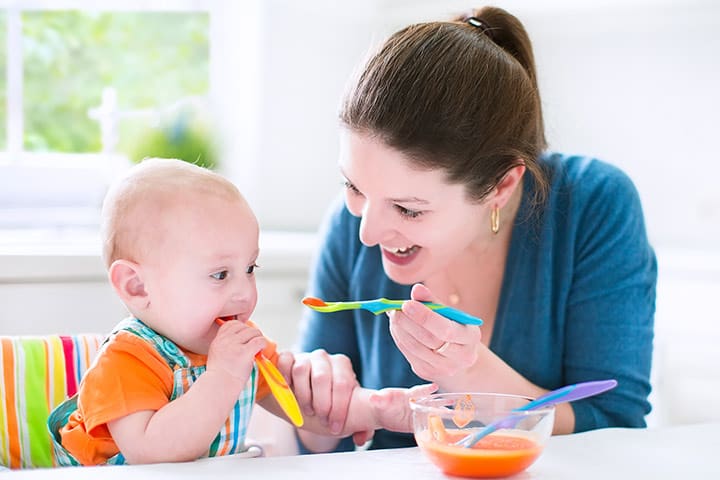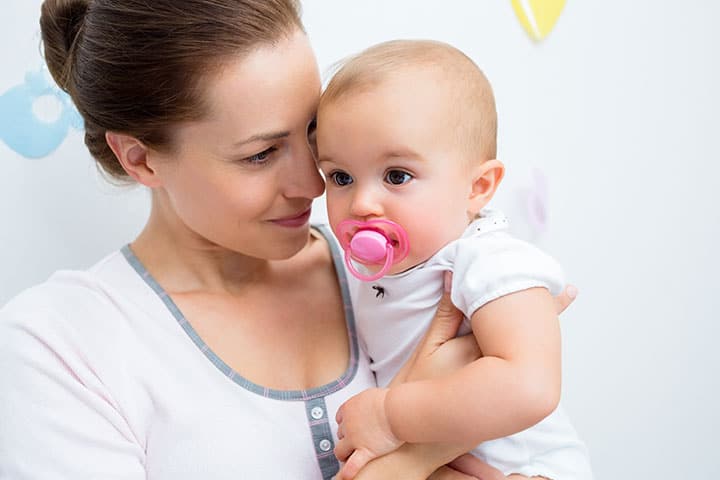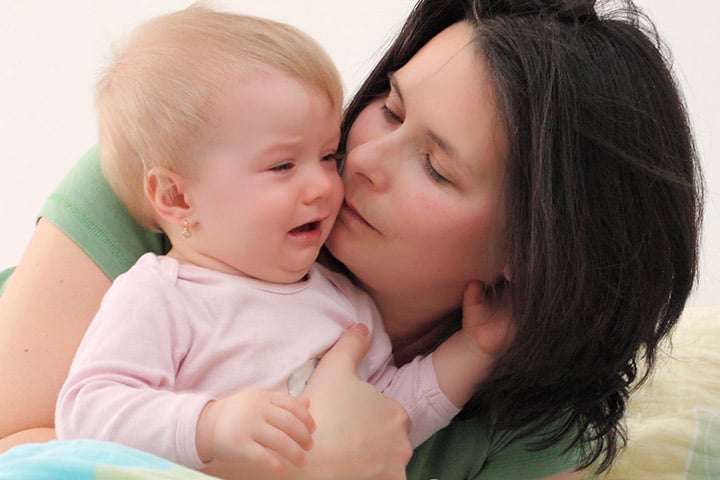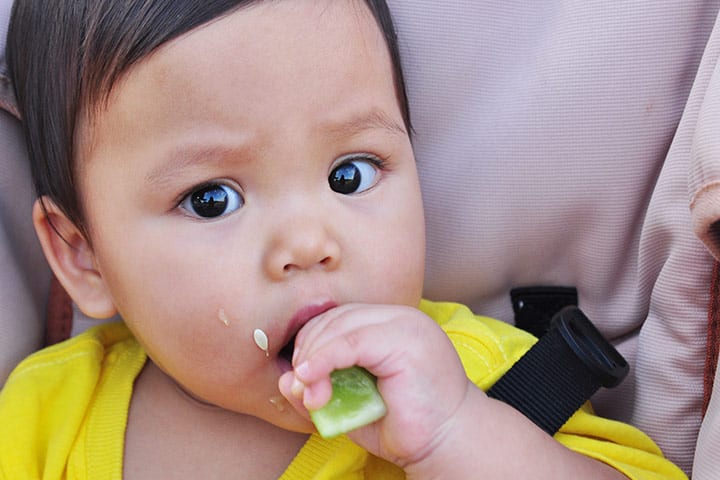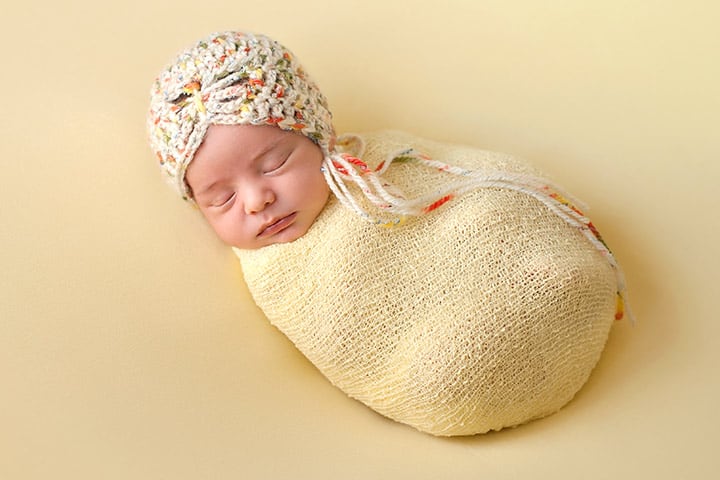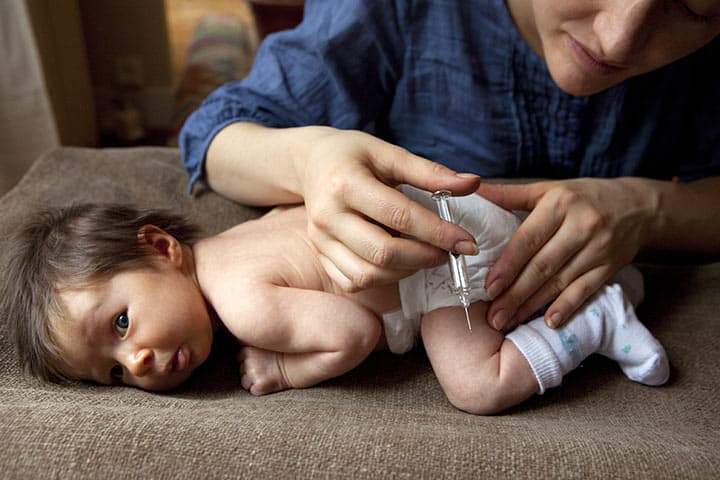How aware are you about the importance of vitamin D for your baby? And how informed are you about the consequences your baby might have to face due to a vitamin D deficiency? Vitamin D is one of the most needed nutrients for your baby, and it is something you, as a mother, should definitely know about.
This post talks about vitamin D with respect to babies. Would you like to know more? Please go ahead.
What Is Vitamin D?
The vitamin that maintains healthy bones and overall good health is Vitamin D. It also plays a major role in fighting infections and makes sure the muscles, heart, and brain work efficiently. (1)
- Strengthens the immune system
- Improves muscle and cardiovascular function
- Helps the respiratory system
- Promotes brain development
- Has anti-cancer effects
Unlike other vitamins, Vitamin D can be generated by the human body. An exposure to sufficient sunlight leads to its synthesis in the skin. On the other hand, no food can help you in replenishing the vitamin D content in the body. Therefore, a regular exposure to the sun along with intake of supplements, if necessary, is advised.
Also, when there is a sufficient quantity of Vitamin D, the body converts it into a hormone called calcitriol, or “activated Vitamin D”. This in turn helps in regulating the levels of calcium and phosphorous and in the mineralization of bones.
How Does Vitamin D Work?
When the human body is exposed to sunlight, a number of chemical reactions take place. The absorbed sunlight in the skin is converted to vitamin D and is sent to the liver. Similarly, when all the sources of vitamin D enter the body, be it in the form of food or other supplements, the gut sends them to the liver. This in turn changes into a substance called 25(OH)D, which is sent to all the parts of the body.And as it reaches the kidneys, it converts 25(OH) into activated vitamin D. The two major roles of activated vitamin D are:
- Vitamin D manages calcium in the blood, gut, and bones.
- Helps cells all over the body to communicate properly.
Symptoms Of Vitamin D Deficiency In Babies:
Often, symptoms of vitamin D deficiency are not visible. Rather, they can be vague or even non-specific. A general irritability or fussiness might be the only pointers. But this can easily go unnoticed. Hence, watch for some of these symptoms in your babies to find out whether your little one is vitamin D fit.
1. Soft Skull:
Unlike in healthy babies, the solidification process of the skull bones to join together right after childbirth is limited in infants that have a Vitamin D deficiency. This results in an unusually soft scalp in the infant that puts her in danger of sustaining a severe fall.
2. Delayed Achievements Of Milestones:
One major reason your Paediatrician keeps on asking whether your baby has achieved milestones appropriate to her age, is to check the baby’s vitamin levels. For instance, a Vitamin D deficient baby is likely to find it tough to sit up by herself or effortlessly crawl. In some cases, her limbs may even appear swollen due to abnormally wide bones. She might even show restlessness due to weak muscles and subsequent pain in the bones, which can develop as a result of Vitamin D deficiency.
3. Bone Deformities:
Outwardly bowed legs and a crooked spine can be the signs of bone deformities in your baby. Insufficient Vitamin D levels, hence, deter healthy development in babies.
4. Poor Growth:
Height is usually affected more than the weight. It is seen that babies with insufficient stores of vitamin D take a longer time to take their first walking steps.
4. Tooth Delay:
Children with Vitamin D deficiency will show signs of delayed teething. This indicates that the growth of milk teeth has been affected.
5. Weak Immune System:
Babies are more prone to infections and some diseases when they have an acute deficiency of Vitamin D. Respiratory disorders, in particular, are visible in such babies. This occurs due to weak chest muscles and a soft rib cage.
Who Are At Risk?
Though every baby requires sufficient proportions of vitamin D to stay fit and fine, some of them can have a highter need of the vitamin. This can be due to an insufficiency in the quantities transferred to the fetus from the mother’s body, which in turn is vitamin D deficient. As a result, such a baby has a higher risk of having a vitamin D deficiency than others. Similarly, there are other instances also where few babies are likely to suffer from a vitamin D deficiency. Take a look at them.
- The body is unable to make enough vitamin D
- Lack of vitamin D in the diet
- Those who cover the skin mostly
- Who are mostly indoors
- Have darker skin
- Who are breastfed for a long time
- Whose mothers suffer from a Vitamin D deficiency
Major Diseases Due To Vitamin D Deficiency In Babies:
Vitamin D primarily takes charge of maintaining healthy bones and muscles in the body. Vitamin D for infants is extremely crucial. There are a number of other roles it plays for the proper functioning of the human metabolism. A discrepancy in the required quantity of its levels in the body can result in a number of disorders in babies. A few of them are:
1. Rickets:
A deficiency of vitamin D, calcium and phosphate causes rickets. It leads to the softening and weakening of bones and is most commonly visible in babies between 6 to 24 months of age. In adults, a similar complication that arises due to vitamin D deficiency is Osteomalacia. Both these diseases retard the strength and appearance of human bones. If left untreated, or if the treatment is delayed, it can lead to permanent bone deformities.
2. Cardiomyopathy:
In rare cases, an extremely low vitamin D level can cause weakness of the heart muscle. This refers to Cardiomyopathy.
3. Other Diseases:
Vitamin D deficiency also finds a link to a number of other diseases like cancer, heart diseases, infectious disorders, autoimmune diseases and diabetics. It is not that lower levels of vitamin D essentially mean you will get any of these diseases. Studies indicate the deficiency can be a contributing factor to the cause.
Pregnancy And Vitamin D Deficiency:
The amount of Vitamin D stores in the body of a pregnant mother has enough impact on the fetus and, therefore, an intake of supplements should begin during pregnancy. However, some women are more prone to be deficient in Vitamin D compared to others. For example, woman,
- Who are obese
- Who spend more time indoors
- Who have dark skin
The Food and Nutrition Board advises pregnant women to take a daily dose of 600 International Units of Vitamin D supplements to ensure the new born baby is Vitamin D fit.
Breastfeeding And Vitamin D Deficiency:
A baby’s vitamin D store goes up while in the womb and falls down after birth until she receives the vitamin D from exposure to sunlight and diet intake. Only small amounts of Vitamin D are transferred from the mother’s milk to the baby. And if the mother herself is deficient, then the baby is severely at risk of falling short of vitamin D.
Interesting information in this regard is that, not always does breast milk fall short of sufficient Vitamin D content. The vitamin D concentrations in Africans who are living ancestral lifestyles are high enough to give an infant all the vitamin D he/she needs.
But, as it is not possible to make all lactating mothers to imbibe the ancestral equatorial lifestyles, measures have to be found to incorporate high levels of Vitamin D in the blood content of lactating mothers. This refers to 5,000-6,000 International Units of Vitamin D in the mother’s blood. But, vitamin D doesn’t stay in the blood for long. So, if the mother stops taking her vitamin D supplement for a day or two, the vitamin D content in her milk will decrease.
But another argument in this regard is, although a deficiency of Vitamin D in babies can be replenished by feeding the lactating mothers with large amounts of Vitamin D supplements, this is not advisable according to doctors. Findings suggest that the deficiency can be prevented by moderate maternal supplementation, increasing sunlight exposure for the pregnant and lactating women, along with routine supplementation of Vitamin D drops to the infants. (2) Vitamin D drops for infants helps supplement the deficiency.
Unlike breast milk, formula milk has high proportions of Vitamin D and hence the formula-fed babies are at lower risk of being deficient.
Newborns’ Need for Vitamin D:
Vitamin D for newborns is extremely important.Recent studies indicate the drastically low levels of vitamin D in the blood of a newborn can increase their risk of developing respiratory infections during infancy, and accelerates the occurrence of wheezing during early childhood. Though no results have proven an incidence of asthma as a result of this, the studies reveal the fact that widespread vitamin D deficiency contributes to risk of other infections also. An associate professor of medicine at Harvard Medical School, Camargo, says, “Since respiratory infections are the most common cause of asthma exacerbations, vitamin D supplements may help to prevent those events.” (3)
It is interesting to note that respiratory infections are seen more in the winterswhen vitamin D is also low due to the limited supply of sunlight. Researchers think that this may be a determining factor for someone’s chance of developing a respiratory infection. While it is thought that having enough vitamin D may help to prevent a respiratory infection, more experiments need to be done to determine if taking vitamin D supplements can prevent respiratory infections, or make the duration of the illness shorter.
How Much Vitamin D For Babies?
The American Academy of Pediatrics recommend a Vitamin D supplement of 400 International Units per day for a breastfed baby. Babies who are formula fed but drink less than 32 ounces of formula a day also need 400 IU of supplement.
Studies indicate that during the first year of life, less than one-fifth of all infants ever get as much as the recommended 400 IU per day from any source, and fewer than one out of 10 breast-fed infants meet the requirement.
How To Give Vitamin D For Babies?
There are quite a number of Vitamin D supplements that are readily available. But stick to the name suggested by your Paediatrician. Ideally, liquid drops are given to babies. These vitamin D drops for babies can be given to the baby in many ways. You can either give them directly to the baby, or if she shows a disliking to the taste, you can even mix it with her food and ensure she has her daily quota of Vitamin D.
At the same time, babies who are breastfed by mothers, and who regularly take a supplement of 6,400 International Units, get 800 International Units of Vitamin D in a litre! This means, such babies would not have a need to depend on supplements for ensuring enough Vitamin D supply.
What If You Exceed The Dose?
Verifying accuracy in the dosage of drugs while administering drugs to babies is always important. No side effects are associated with vitamin D supplements for babies when had in the prescribed proportion. Yet, very high doses can increase the quantity of calcium in the blood. This can lead to unusual thirst, frequent urination, nausea or vomiting, dizziness and headaches. Call your doctor if you find any of these symptoms in your baby, especially when you doubt whether you have exceeded the dosage of her daily vitamin D drops.Vitamin D drops for baby are administered in the prescribed amount only.
Babies Under The Sun:
Usually, infants below 6 months are not exposed to sunlight much and hence, a Vitamin D supplement from the early days after birth is important. At the same time, an overexposure to the sun is also linked to skin cancers. The extra delicate skin makes her more vulnerable to sunburns. Hence, caution should be exercised while bringing her to sunlight and don’t forget to put her in protective clothing.Follow sunscreen measures as well.
Factors That Reduce Sunlight Synthesis In Babies:
In spite of human bodies generating Vitamin D with regular exposure to sunlight, some factors detract this ability in us. This is significantly evident in babies. Here are those factors:
- Living at high latitudes (closer to the polar regions), particularly during winter months
- Air quality conditions: high levels of air pollution
- Weather conditions: dense cloud covering
- The degree to which clothing covers the skin
- Use of sunscreen
- Skin pigmentation: darker skin types (4)
How To Prevent The Deficiency:
With vitamin D deficiency becoming a much talked about paediatric health issue, it will be wise on our part to take enough measures to keep our baby from falling short of the desired vitamin D levels. Complications including hypocalaemic seizure, rickets, limb pain and fracture are associated with the deficiency. Therefore, it would be good to stick to the dictum that prevention is better than cure. These are some steps to prevent vitamin D deficiency in babies:
- Pregnant women, especially the dark skinned or veiled, should be screened and treated for vitamin D deficiency in order to ensure the infants do not suffer.
- Breastfed infants of these women should be administered a daily dose of vitamin D supplements compulsorily for the first year of their life. The dosage ideally should be 400 IU per day. If compliance is poor, an annual dose of 1,50,000 IU may be given. (5)
Regular yet controlled exposure to sunlight for the infants for cutaneous synthesis of vitamin D can be helpful. However, this is not largely encouraged for the fear of causing a sunburn, which can prove cancerous later in life.
Treatment Of Deficiency With Symptoms:
Below is a table that suggests the treatment dosage for both infants and babies.
| Category | Vitamin D dose and frequency | Duration |
| Upto 6 months 6 months-12 months |
1,000 to 3,000 units daily 6,000 units daily |
4-8 weeks 4-8 weeks |
It is essential to check whether the baby has a sufficient dietary calcium intake, and that a maintenance Vitamin D dose follows the treatment dose.
Food Sources Of Vitamin D:
Vitamin D is one of the trickiest components to deal with while attending to the well being of your little one. This is due to the fact that an insufficiency in the vitamin cannot be fully addressed even by the best diet. A judicious balance of enough exposure to sunlight, a vitamin D rich diet, along with the prescribed dose of calcium drops only can help to keep the deficiency at bay. Here are a few foods that are loaded with vitamin D.
- Oily fish ( such as sardines, pilchards, herring, trout, tuna, salmon and mackerel)
- Cod liver oil
- Fortified foods ( this means they have vitamin D added to them) such as margarine, and some cereals
- Infant formula milk
- Eggs
- Milk
- Cheese
- Orange juice
Those who are strict vegetarians are likely to have potential risks of suffering from vitamin D deficiency as they do not have fish in their diet. At the same time, it would be good to note that even adults can’t fully benefit from food sources to replenish Vitamin D deficiency and hence, supplements are not to be missed in babies. Talk to your baby’s dietician to find the best supplements for your baby. (6)
Ragi Dishes For Your Baby:
Talk about calcium and vitamin D, you can’t miss ragi. A vital component for increasing bone strength, you can resort to some delectable ragi recipes to bid adieu to vitamin D deficiency to a great extent. One of the best super-foods you can give to your baby, there are a number of ways to cook those boring-looking brown beads and come up with some lovely dishes. Here are few beautiful ragi concoctions that are worth trying for your baby.
- The classic ragi porridge – one of the first solid foods you can confidently give to your baby.
- Ragi malt – a natural energy drink for your little one.
- Ragi Idli – its more than the coloured version of those boring idlis.
- Ragi wheat bread – with yogurt, wheat, spinach, gur and ragi, you can make an unforgettable bread.
- Ragi malpua – have fun with a healthy combination of oats and ragi to make this lovely dessert.
- Ragi cookies – give your biscuit loving baby a healthy treat with these crispy munchers.
- Ragi roti – give a healthy and spicy twist to your daily roti with this recipe.
- Ragi oats ladoo – another sweet dessert for your baby is here.
- Ragi wheat dosa – make your baby’s breakfast a little more exciting with this new dosa avatar.
- Ragi mudde – another crispy bite for the babies who have already started showing their white pearls.
Vitamin D is indisputably one of the vital ingredients your little one will need since her early days of birth. With life term consequences, she might suffer in the absence of sufficient quantity of vitamin D in blood, and so you can’t afford to ignore any of the deficiency symptoms.

